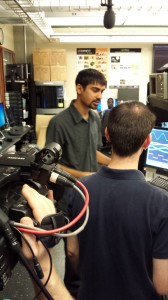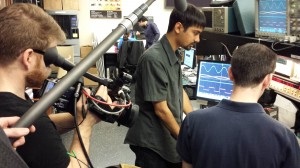 The Computing Community Consortium (CCC) is releasing its third segment in the Computing Research in Action Series. This segment features the Ubiquitous Computing (UbiComp) research lab, led by Professor Shwetak Patel, at the University of Washington. The UbiComp lab, which consists of an interdisciplinary team of students (CS, EE, CE, ME), focuses on solving interesting and socially meaningful problems using a mix of hardware and software applications.
The Computing Community Consortium (CCC) is releasing its third segment in the Computing Research in Action Series. This segment features the Ubiquitous Computing (UbiComp) research lab, led by Professor Shwetak Patel, at the University of Washington. The UbiComp lab, which consists of an interdisciplinary team of students (CS, EE, CE, ME), focuses on solving interesting and socially meaningful problems using a mix of hardware and software applications.
The UbiComp lab focuses on four areas of ubiquitous computing:
Novel interaction techniques: With the growing number of computers around us embedded into the environment, there is a need to interact with these computers beyond the traditional keyboard and mouse.
Sustainability sensing: Using computer science, machine learning and signal processing can give homeowners information about not just how they are consuming energy, but also exactly where that energy is going and how it is being used.
Low-power sensing: The so-called “smart home” has been an elusive goal due in large part to a lack of sufficient battery life in sensors. Low-power sensing solves this problem by extending the life of a sensor by decades. This allows sensors to be placed throughout a house’s walls, floors, crawl spaces and attic, allowing the detection of dangers such as mold, humidity, and leaks.
Health sensing: Computing technology is being used to have a significant impact in the quality and cost of healthcare. An example of this is “SpiroSmart,” a mobile phone based application that turns the phone into a spirometer.
 “This research is important because it really shows what the impact of what computer science and electrical engineering can have on people’s daily lives. We’re doing this great work in the lab but a lot of times people can’t relate to it in their daily lives and what we’re doing is trying to solve real applications so that people can actually benefit from this work.” says Shwetak Patel, Director of the UbiComp Lab.
“This research is important because it really shows what the impact of what computer science and electrical engineering can have on people’s daily lives. We’re doing this great work in the lab but a lot of times people can’t relate to it in their daily lives and what we’re doing is trying to solve real applications so that people can actually benefit from this work.” says Shwetak Patel, Director of the UbiComp Lab.
For more information on the UbiComp lab, please visit:
http://ubicomplab.cs.washington.edu/
The CCC is still accepting submissions for the Computing Research in Action series. Selected projects will receive a $1,500 travel award for a research team member to present the featured project at a conference. We encourage you to submit your research project for consideration by filling out this short entry form. If you have any questions about our series, please don’t hesitate to reach out to Kenneth Hines, CCC Program Associate.










Trackbacks /
Pingbacks